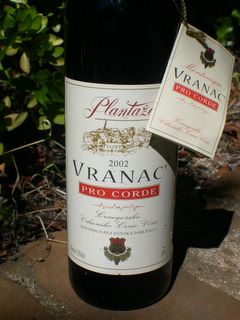A perfect year in Bordeaux
'I am extremely optimistic,' Chateau Margaux director Paul Pontallier – who starts the Merlot harvest today – told decanter.com. 'So far growing conditions from day one have been close to ideal. I have never seen that before.'
[My emphasis on that preceding. Well, so much for their continual claim that Brdx is always 'perfect'...if this is the first time this guy's ever seen it... /huge]
Sugar levels in the grapes are the highest they have been in 100 years, with the Merlot at 14.5 degrees and the Cabernet at 13, Pontallier said.
In St Emilion, Jonathan Maltus at Chateau Teyssier said, 'Nobody's seen numbers like this before. Our Merlot is at 15.2 degrees sugar.' In a normal year Merlot and Cabernet would be picking at more than a degree lower than that.
[The next line explains it all - and exposes the hypocrisy of the EU stereotype of 'New World' wines...again, emphasis is mine/huge]
A summer with only the lightest rain not only means high sugar levels but thick skins and small berries – which will result in wines of a wonderful depth of colour and superb concentration, producers are hoping.
Not only that but most terroirs report a marked difference in day and night time temperatures, helping the ripening process and aroma development. There is no sign of stress, except on very sandy soils.
***
So again we see that for them it's a perfect year with those conditions...and some Merlot alcohol levels in the 14.0% to 14.7% range.
How come that's OK for them to do but not everyone else?
And in the back of your mind, didn't it sound like he was describing a 'typical' year on the California coast?
But when that happens here in California it's considered to produce coarse & uncultured wines...at least by our EU brethern...all of whom now hope that their wines will be big, powerful, and concentrated.
If that IS the case with this vintage, then they can expect to see increased sales, which will help their wine industry out of it's slump - even if it's just for the short term (the larger problems they face aren't going away with a single 'good' harvest - that'll take much more effort and time to correct).
Parker will probably score this year highly. Jancis Robinson, however, will likely find all of Bordeaux on the 'ridiculous' side...
Can't wait to see them both come out from their corners swinging...!











